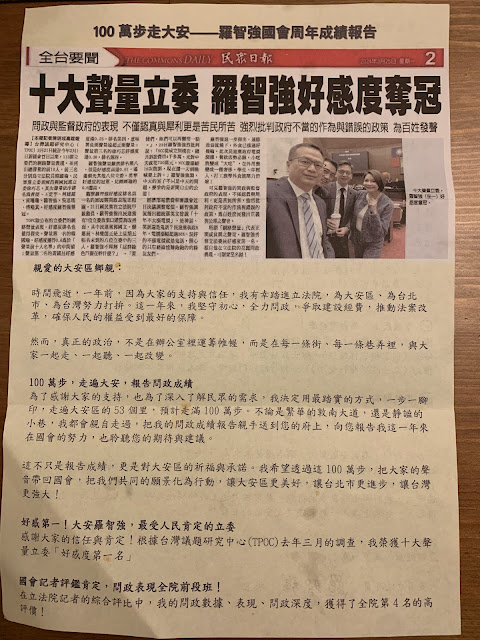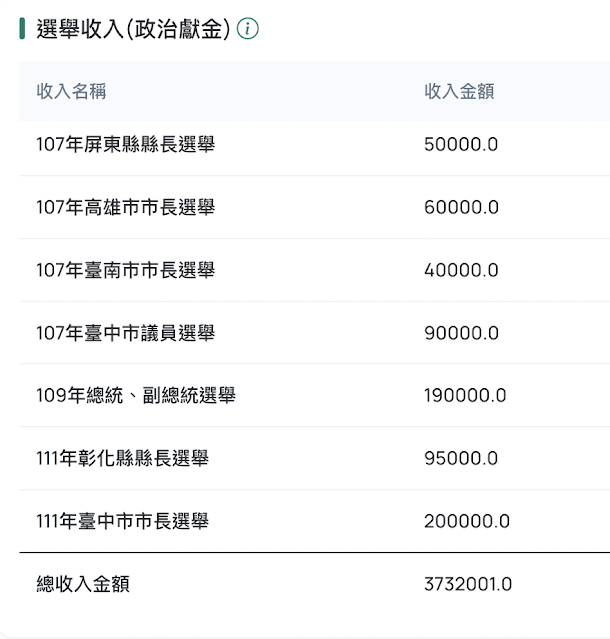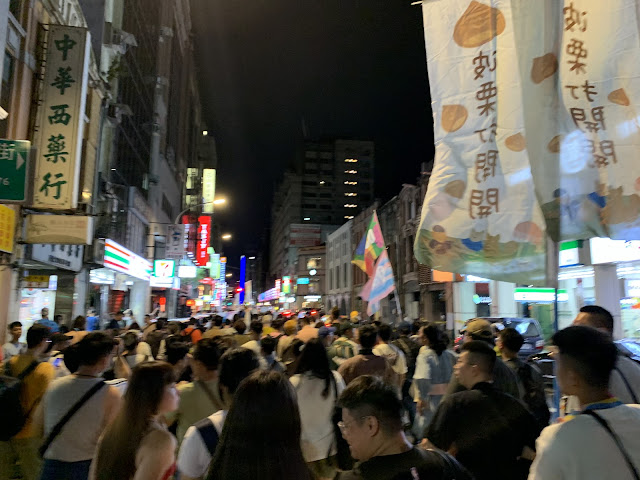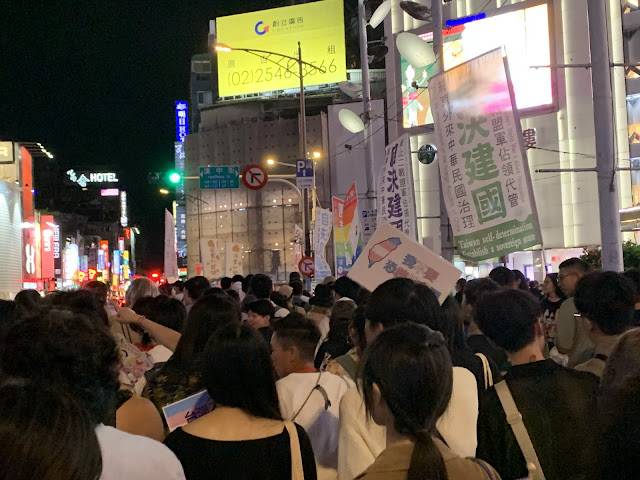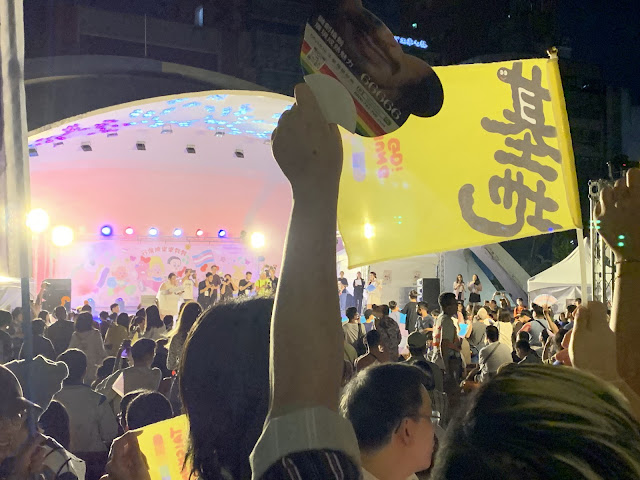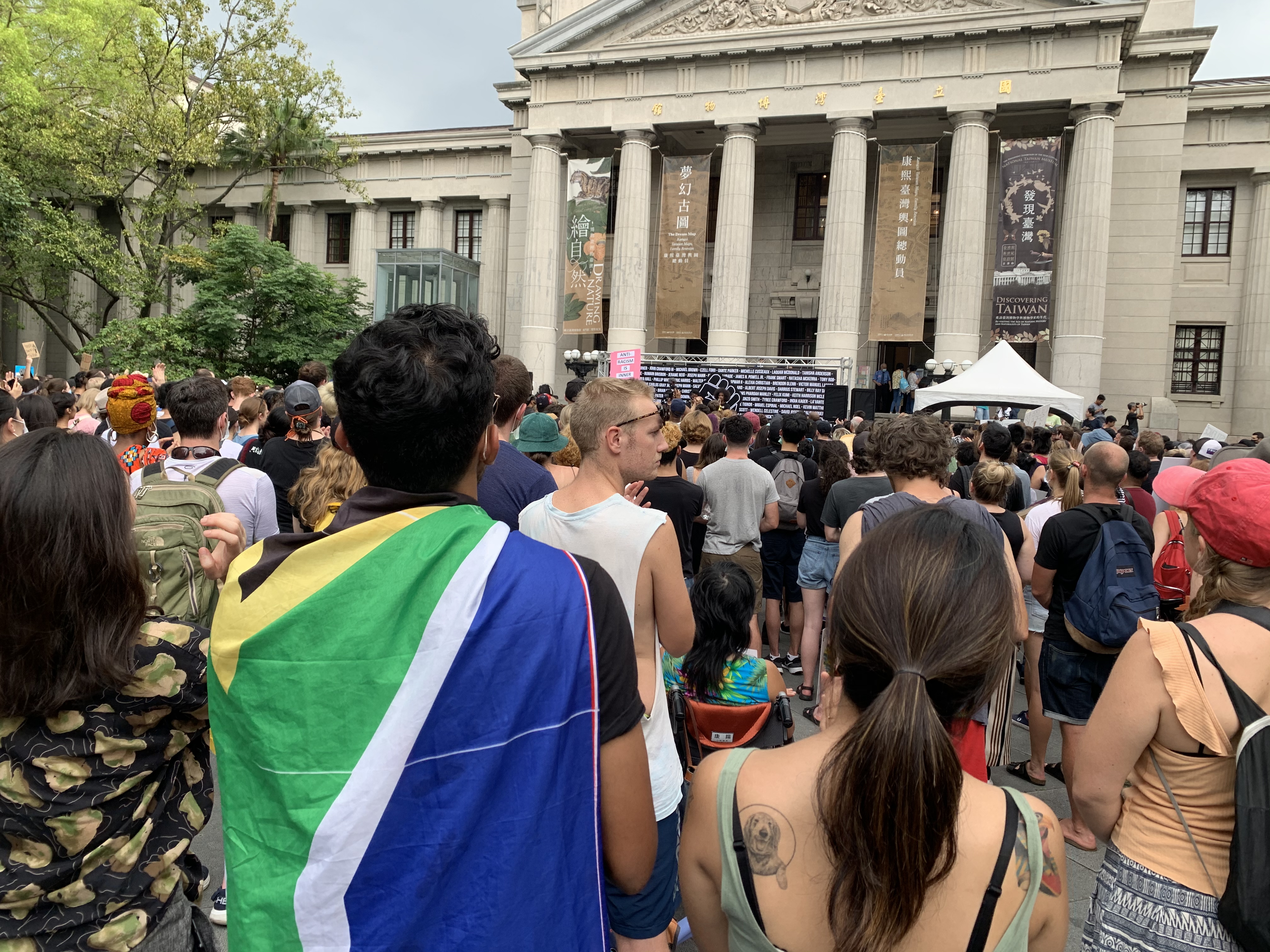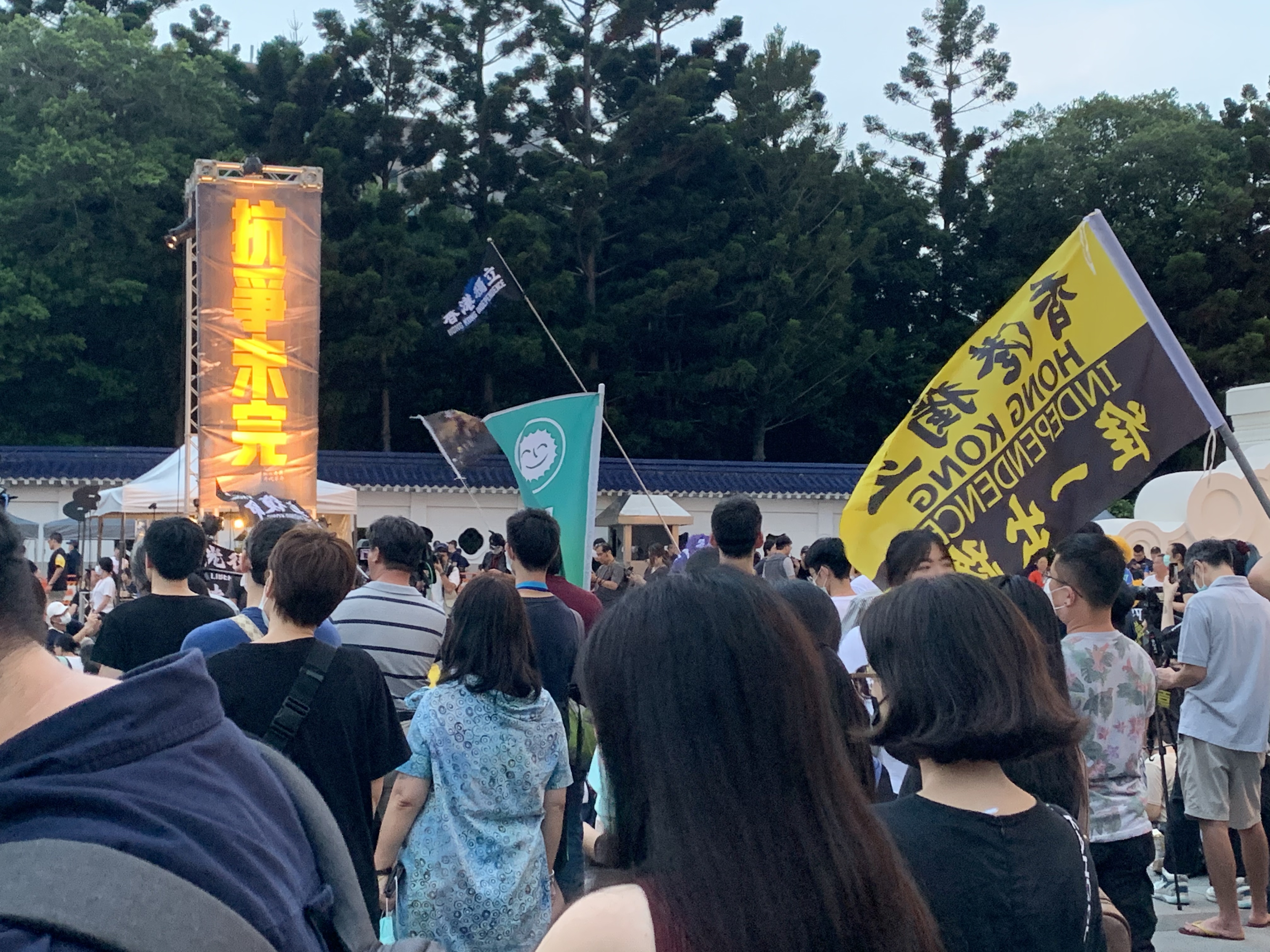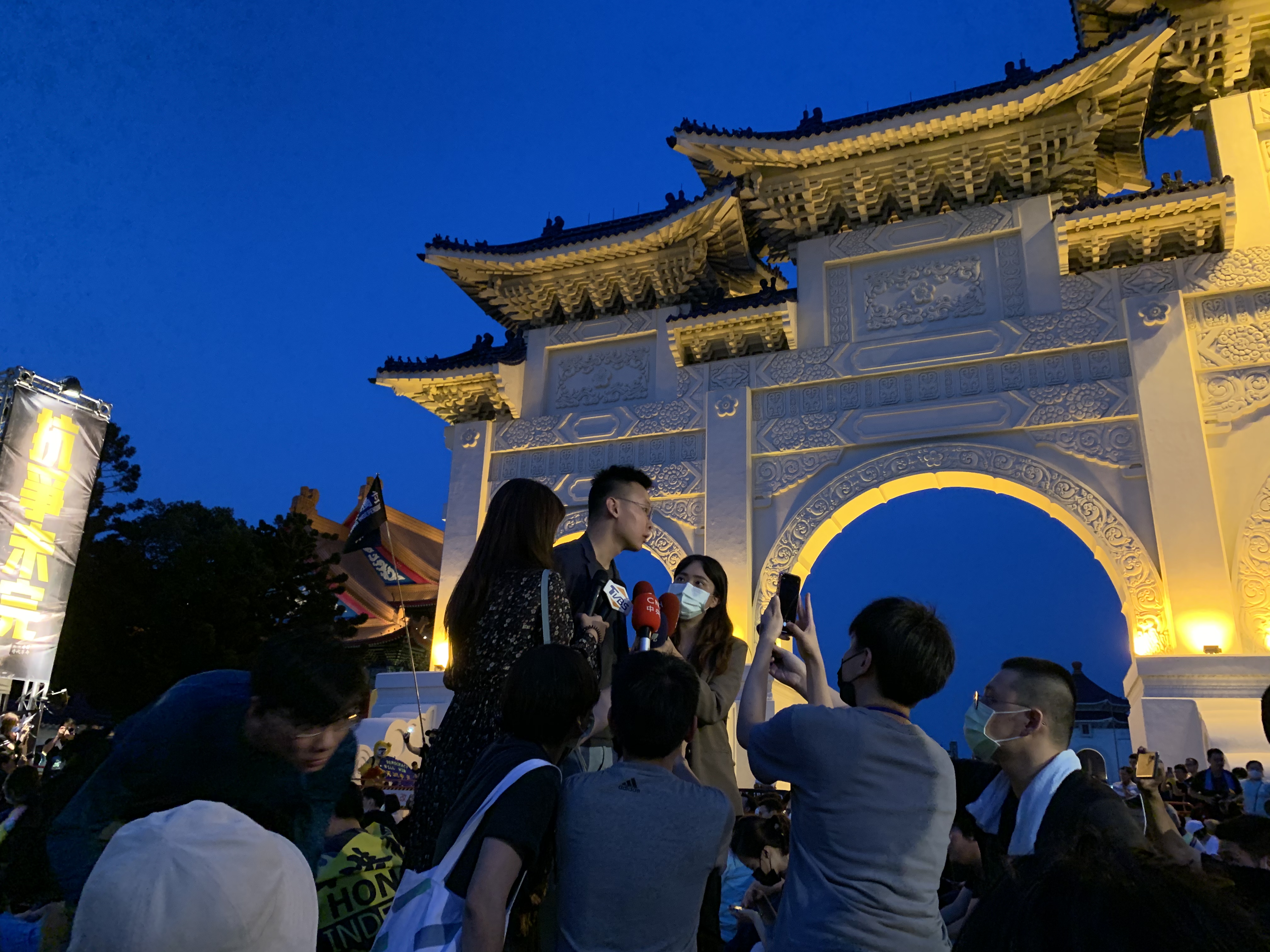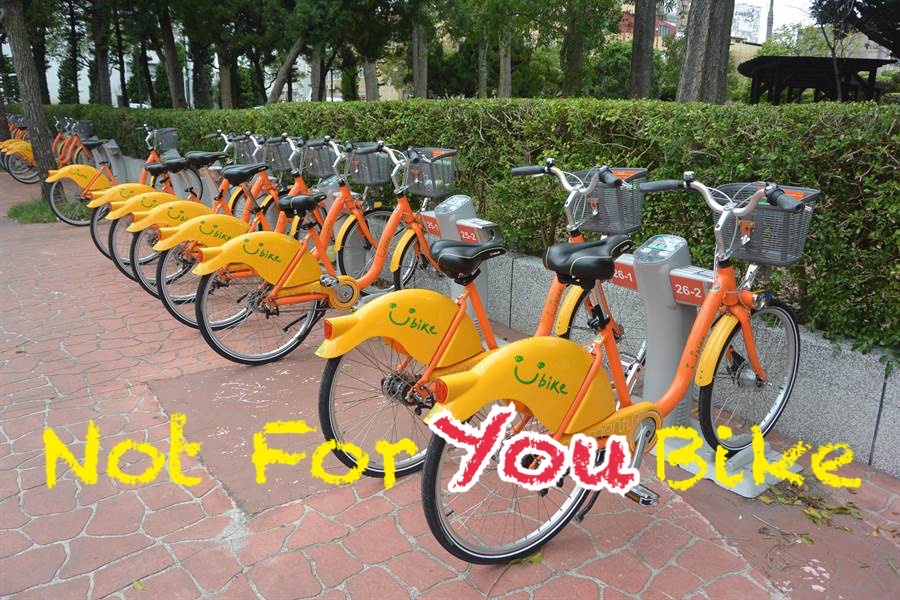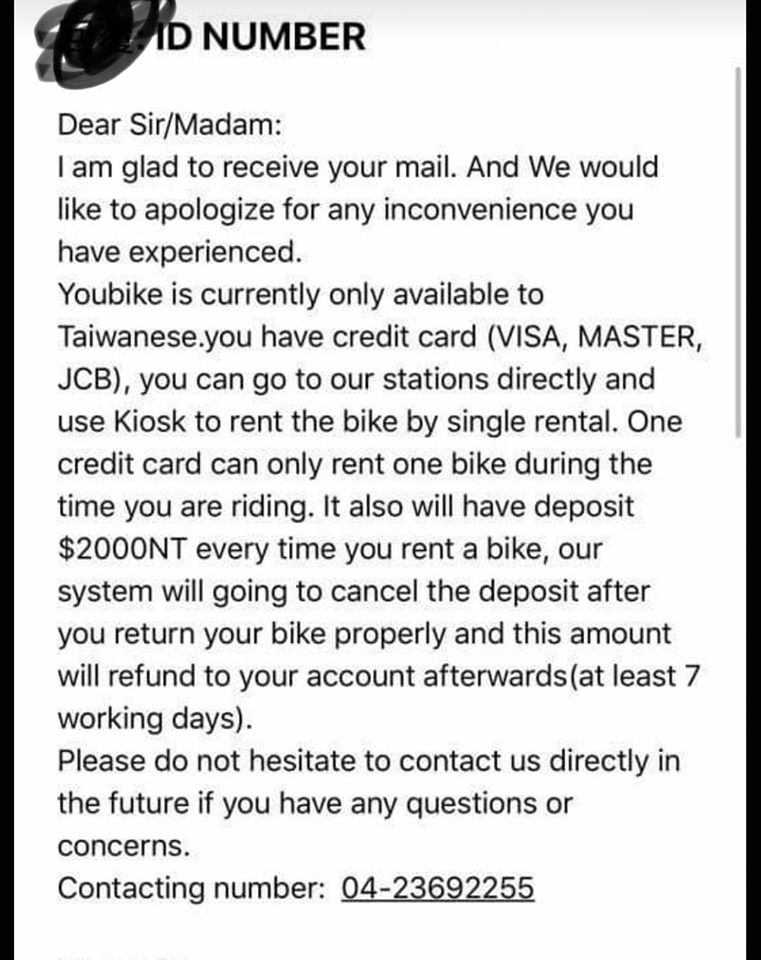Small updates (July 9th): I saw the recall bus, and Da'an Reboot put out a schedule for pro-recall rallies. The one on Sunday at 7pm at Tonghua Night Market will feature guest speaker and DPP legislator Huang Jie:


Frozen Garlic recently wrote an interesting piece on his classification of the different types of districts (or in some cases legislators) facing recall. My district is in his third group: legislators who have been so controversial that anger against their antics has underpinned the overall recall drive. It also happens to be a deep blue district; the KMT has never lost Taipei 6 since it became a single-member district in 2008. Even if Lo is recalled, his replacement will almost certainly be KMT. The best we can hope for is that they'll be a better-behaved, humbler KMT legislator.
Frozen Garlic noted that the KMT has generally chosen to fight the recalls. In my district that's certainly the case. While it may not always make sense -- low turnout might benefit the sitting legislator in some districts -- it does here. The question isn't whether the KMT has a strong base here, it's whether those furious with Lo can garner a higher turnout than the "vote blue no matter how delulu" crowd.
I'm not an elections expert, but I thought I might add some color to this observation. What does it actually look like to see Lo Chi-chiang fighting for his career in a place where his seat should be so easy to keep that it's essentially a lifetime commission, and yet he's still managing to screw it up?
A little backstory to Lo's election: I get the impression it was the most competitive in this district...well, ever. Miao Poya (苗博雅) ran a surprisingly strong race against him. She's accused Lo of being something of a drop-in candidate, having resigned his seat on the Taipei City council to run for mayor of Taoyuan against the KMT's wishes, and returning to Da'an/Wenshan in order to run for the legislature in an election which was delayed long enough to allow him to run. There was also a question of when he (re?)obtained residency in the district vis-à-vis the primary.
Regardless, Lo won, because that's what Taipei District 6 does: it elects the KMT.
Lo sued Miao over these comments during the election, saying she was trying to "prevent him from being elected". That strikes me as a bit odd -- isn't that the whole point of running against someone in an election? To me, Miao's talking points seemed fairly typical campaign talk. The courts agreed, and the lawsuit was dismissed. Keep this in mind for now.
My first inkling that Lo was fighting the recall (or perhaps scared that he might lose) was the deeply unprofessional "newsletter" he handed out in March. The disinformation-laden article at the top of an otherwise boring political flyer pointed toward an effectively-defunct newspaper that seems to be owned by pro-unification actors, through which a fair amount of donations to Taiwanese political campaigns flowed in one direction, and government contracts (?) flowed in another. The Hong Kong-based parent company of this "newspaper" was disbanded in 2022, so the sources of its funding and political donations are, shall we say, unclear.
I can't say for sure to whom those campaign donations went, but considering which legislator handed me that "newsletter" topped with a year-old article from that "newspaper", I can guess.
Recently, I've noticed more of Lo's anti-recall efforts in the real world, whereas more pro-recall talk online. This is more a reflection of my subjectivity than reality. Of course I'd see more anti-recall action here in Iron Ballot Land (Lo's 鐵票區), and more pro-recall talk on social media, where I preserve my sanity by following the recall effort, but not Lo himself.
My neighborhood has been inundated with the most useless of all campaign workers: Sign Holder-Uppers. They don't really interact with passerby as far as I've seen -- no conversations, no handing out flyers, not even really smiling or waving. Not at me, nor at any other pedestrians or cyclists I've seen. They're only slightly more obvious than billboards, but a lot more labor-intensive. I imagine they give this job to the most-disliked volunteers.
The recall activists have also been scouring the district, often in the form of scooter crews with pro-recall flags, though I haven't actually seen one. I did come across these flyers, which aren't specific to Lo Chi-chiang. It was handed to me on the street, not stuffed in my mailbox. According to friends who've received it, has been distributed more widely than Lo's district.
The text is comprised of fairly standard pro-recall points. The black and red one with the pro-recall ballot on the other side states the the Legislative Yuan cannot be held hostage by (deputy speaker) Fu Kun-chi (傅崐萁) and pro-communist forces. This makes sense from a campaign perspective: Fu is widely hated across Taiwan; even people I know who don't follow politics are quick to say they can't stand him or "he's got to go". This includes people who find legislative minority leader Ker Chien-ming (柯建銘) irritating -- to quote one person I know, "Ker is annoying but Fu...oh my god!"
The four headings say of the legislators up for recall: "Destroy the Constitution and Trash the Government"; Pro-China, Pro-Communist"; "Weaken National Security" and "Hollow Out Taiwan".
The white flyer with Fu Kun-chi looking terrible on the opposite side lists six reasons to support the recall:
1.) The Red Media (that is, pro-China media outlets) are strong and spread conspiracies every day
(This strikes me as absolutely true; the CCP has got its tentacles into quite a large chunk of Taiwan's media, including formerly pan-blue media that has gone completely pro-China. I frequently hear their pro-China nonsense regurgitated by my mostly pan-blue neighbors)
2.) A number of imported Chinese products have hidden origins
(I hadn't heard about this happening specifically but it wouldn't surprise me.)
3.) Chinese immigrants obtain legal status and 'wash' the population
(This means that the number of pro-China voters is increasing as the KMT seeks to make it easier for Chinese citizens, usually spouses, to immigrate to Taiwan. I'm generally against making it any easier for a foreigner from China to become Taiwanese than a foreigner from anywhere else; on the other hand I worry about rising xenophobia. I'd be more concerned about deliberate CCP influencer plants in Taiwan than spouses.)
4.) Declaring a 'state of civil war' between Taiwan and China
(This discusses the proposed Cross-Strait People's Relations Ordinance" amendments. It's interesting, as many people assume that the ROC and PRC are still technically in a state of civil war. I'm not a legal scholar, but I would assume that despite there being no official treaty ending that war, the constitutional amendments of the 1990s effectively ended it for the ROC side. The government seems to imply this, as well, by positioning the civil war as in the past and highlighting where the ROC government claims jurisdiction.)
5.) National Security Weakened
(Yes, that is exactly what the KMT/TPP alliance is doing through budget cuts and proposals to amend various national defense acts.)
6.) The President's National Security Decision-Making Is Hollowed Out
(This notes that the KMT/TPP proposals regarding the National Security Strategy Act take power away from the president and give it to the Legislative Yuan, which is a violation of the constitution. Having read the constitution several times, I believe this would indeed be unconstitutional. Good thing for the legislature that they hobbled the constitutional court!)
I particularly like the six-point flyer, because it offers specifics on exactly what these legislators are doing to merit their recall. Sure, it includes an unflattering picture of Fu Kun-chi, but really, the point is that these people are using the legislature to make it easier for China to harass and even invade Taiwan, while proposing clearly unconstitutional laws that it will be harder to roll back with a crippled constitutional court. And these are the people who claim to be the great defenders of the ROC and its sacred constitution!
The hypocrisy of it all makes me sick.
The set-up for Lo's rally
Lo held a morning rally not far from my home in order to get his base fired up about supporting him on July 26th. I didn't go because I have self-respect, but from what I could hear, it started out sounding like a church service (?), then some shouting, and then a rousing playlist of ROC patriotic schlock.
As I left home to go do more interesting things, I passed some neighbors coming home with what looked like free food and beverages. Although the legal limit on campaign gifts is NT$30 per item, which is why tissues, masks and little notepads are so popular, basic free food items at rallies are allowed. I didn't get a good look at what my neighbors had, but it seemed to be dumplings and drinks. Perhaps not enough, however, to go very obviously against bribery laws.
Online, Da'an Reboot (大安強強滾, which means both "strong roll" and uses a character from Lo's name) is pretty much the only thing I follow on Threads. They have a podcast, too, but I haven't listened to it yet.
There are several pro-recall songs, too. One of these sounds like a standard pro-Taiwan rock ballad in Taiwanese. Another is a weird AI creation of a Bollywood-style song, which I'm a lot less fond of. The AI Bollywood recall song, however, is still catchier than any of the crap played at Lo's rally. I suspect my neighbors might disagree, though. These songs don't target Lo specifically, though the groups trying to remove him have been posting them to social media.
Lo, for his part, has acted somewhat less insane these days, unsure question mark? He seems to be aware that his seat is in real jeopardy and is, at least online, acting with what seems to be a bit more dignity. I assume it does not come naturally to him.
That said, remember the part where he sued Miao Poya for saying this election was handed to him through dodgy means? Well, he's also suing the recall campaign for saying he prank-called Ker Chien-ming. He insists he didn't prank Ker, and frankly I don't really care if he did or not. It's his selling Taiwan out to China that matters.
I do think it's funny that he's suing over it. Prank-calling is childish; maybe he did it, maybe not. But suing someone for saying you did is even more childish. It also shows he takes them seriously enough to try to hobble them with a lawsuit, which is obviously a stupid move.
I haven't heard anything about this since June, so I can only assume Lo realized he made a tactical error that caused him to look like a blubbery tantrum baby and has chosen to no longer emphasize the whiny poopy diaper aspects of his personality. Grow up, dude.
Frankly, I support the recall because I simply do not think Taiwan should be sold to China, and these legislators are out of line.
This goes beyond Lo spouting deranged nonsense and having dodgy ties to questionable media, beyond Fu being an accused sex pest and convicted felon, beyond the fact that Han Kuo-yu (not up for recall this time, but seriously, fuck that guy) was convicted of negligent manslaughter and Wang Hong-wei equivocates on what is and is not sexual harassment.
They're just plain old filthy hypocrites who are selling out the very "Republic of China" they claim to defend. They're allegedly taking money from the CCP while calling the DPP "communist bandits" -- every last one of them should go.
And not even to tip the legislature back to the DPP, though I wouldn't be mad if that happened. Just to scare the KMT into behaving themselves for awhile, if they're able.
Even though districts like mine will probably just elect another KMTer, I want that legislator scared of losing the job they've just won. I want them to be well aware that one of the bluest districts in Taiwan just kicked out the KMTer they elected, and to act accordingly.
And I want Lo to get his just deserts.








